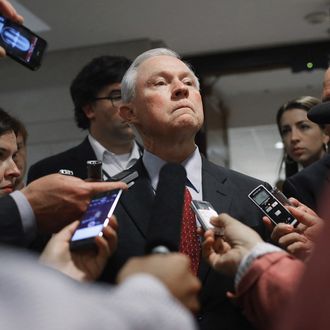
For years now, a quiet but powerful movement to roll back the excesses of the War on Drugs and the mass incarceration it helped spur has slowly made progress across the political and ideological landscape. A natural topic of interest for progressives, it’s gained ground on the right thanks to a combination of Christian conservative prison-ministry pressure, libertarian hostility to hypercriminalization of nonviolent drug use, and concerns about the fiscal costs of mass incarceration. Republican support for reform has been critical not just for the obvious legislative reasons: It made the topic safe for Democrats who might otherwise fear the ancient backlash politics of law and order.
At the beginning of the year, it looked like the first major federal legislation associated with criminal-justice reform might actually go somewhere. Legislation to relax mandatory minimum sentences for nonviolent drug offenses was reported from the Senate Judiciary Committee last October after chairman Chuck Grassley finally climbed onboard. And House Speaker Paul Ryan is on record favoring passage of reform legislation in this Congress.
But there are two separate sources of dissension rising rapidly among Republicans. The first is whether legislation making federal prosecution of white-collar crime more difficult — a long-standing demand of some conservative supporters of criminal-justice reform, most notably the Koch brothers and foundations they finance — can or should be enacted alongside action on mandatory minimums. This linkage has been backed by House Judiciary Committee chairman Bob Goodlatte, but has been opposed by the Obama administration and most Democrats. The second involves a basic backlash to the whole idea of criminal-justice reform. And in a particularly unfortunate piece of bad timing, that backlash is being led by Donald Trump’s best friend and closest adviser in Congress, Senator Jeff Sessions of Alabama.
Best known for his history of dubious racial attitudes and his savage opposition to immigration reform, Sessions is avidly fanning the “new crime wave” fears that arose last year after spikes in murder rates in many cities and claims by conservative commentators — but also by FBI director James Comey — that a “Ferguson effect” was disarming police. And in a press conference Wednesday, he took direct aim at criminal-justice-reform legislation:
“My best judgment after many, many years in law enforcement is that bottom on crime rates has been reached and the rise we’re beginning to see is part of a long-term trend, not an aberration, and the last thing we need to do is a major reduction in penalties,” Sen. Jeff Sessions, R-Ala., told reporters Wednesday …
“This legislation is an irresponsible catastrophe,” said John Walters, who headed the White House Office of National Drug Control Policy under George W. Bush. “People in federal prison are not there because they’re low-level offenders, they’re not principally there because they have an addiction problem. They’re there because they’re narco-traffickers, because they’re greedy, because they’re part of a violent conspiracy.”
This is the sort of talk that could make Republican supporters of reform start nervously looking for knives in their backs, and make Democrats fear the painstakingly assembled coalition for reform will unravel. It’s obviously not helpful that Donald Trump has on occasion echoed the “huge crime wave” talk and his buddy Sessions’s contention that this is the wrong time to do anything other than get tough.
The most likely trajectory in Congress for criminal-justice reform this year will be what Congress is doing on most subjects: nada, zen, zero. But in the longer run, it’s discouraging that the backlash politics that created mass incarceration to begin with may be back with a vengeance.






























